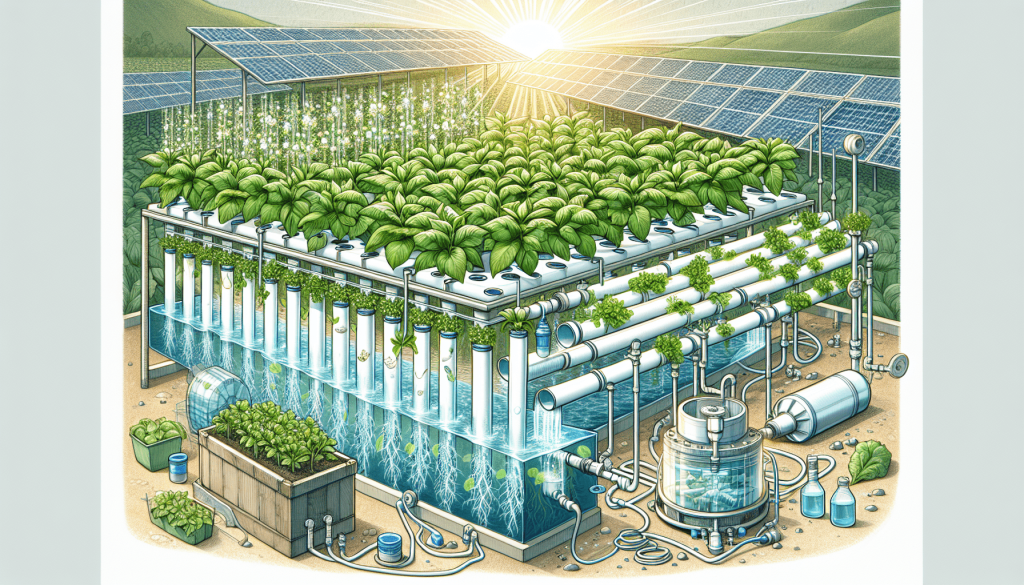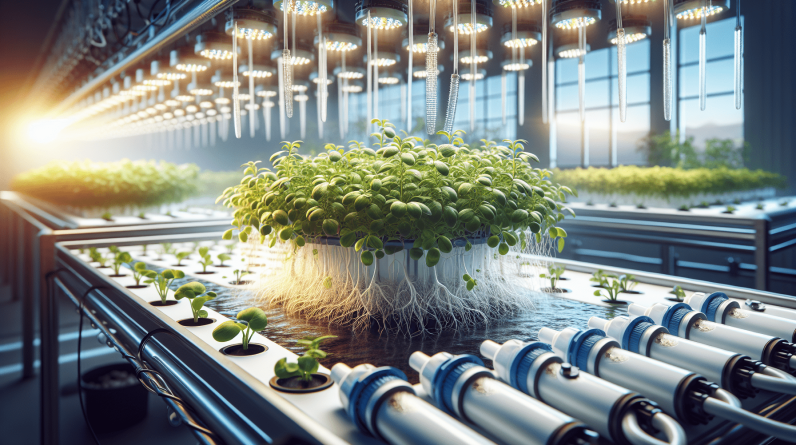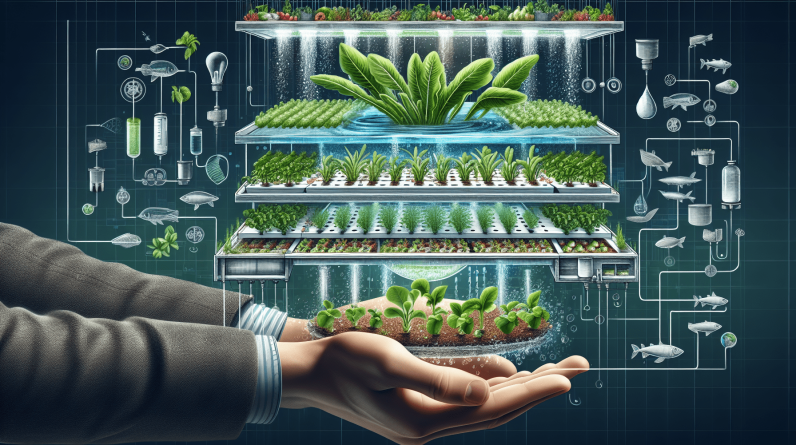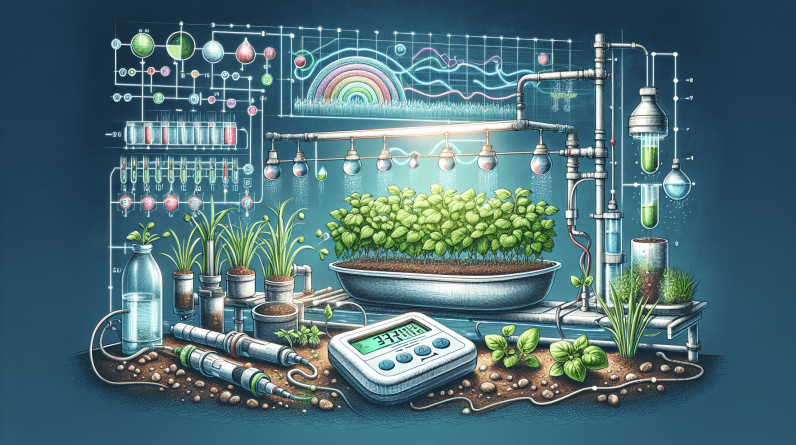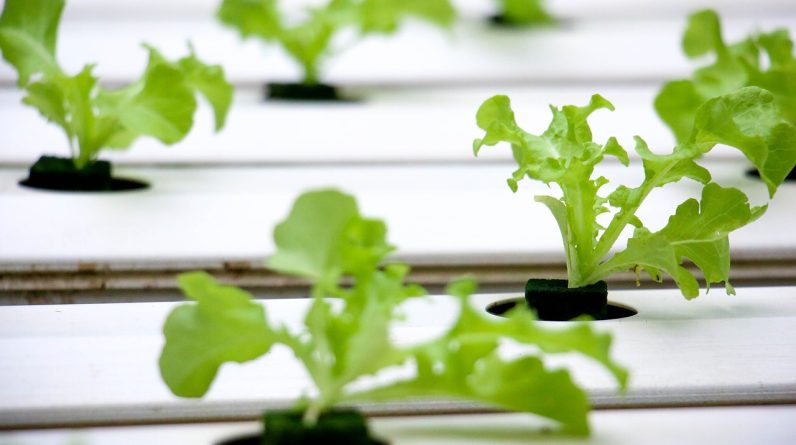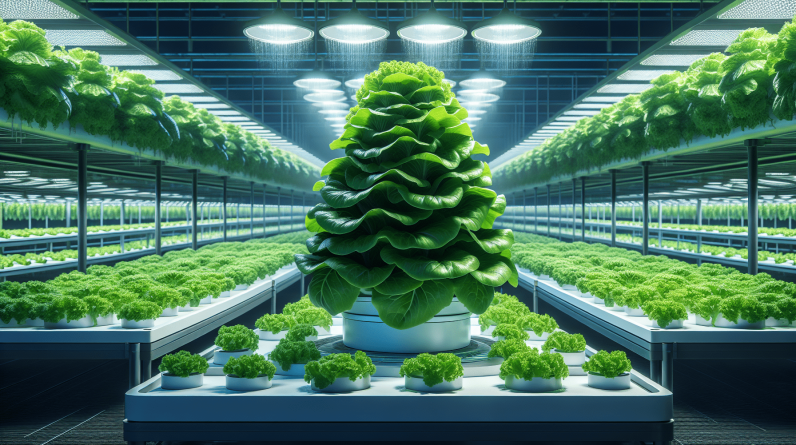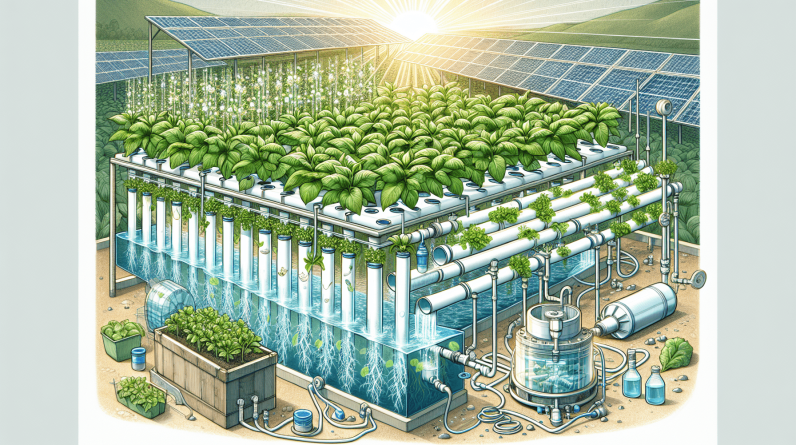
Imagine being able to grow your own fresh, healthy produce right in the comfort of your own home, without the need for soil or traditional gardening techniques. With hydroponic gardening, this is now possible. By using nutrient-rich water solutions instead of soil, hydroponics not only offers a more efficient way of growing plants, but it also brings with it a host of environmental benefits. From conserving water to reducing the use of harmful pesticides, hydroponic gardening is a sustainable and eco-friendly solution that has the potential to revolutionize the way we think about food production.

Water Efficiency
Reduced water usage
Hydroponic gardening offers a significant advantage in terms of water efficiency. Compared to traditional soil-based gardening, hydroponic systems use up to 90% less water. This is because hydroponic systems are designed to deliver water directly to the plant roots, eliminating the need for excessive watering or irrigation. By precisely controlling the water supply, hydroponic gardens ensure that each plant receives the necessary amount of hydration without wasting excess water through evaporation or runoff.
Elimination of water runoff
One of the major environmental issues associated with traditional gardening is water runoff. When water is applied to a soil-based garden, it often seeps into the ground, carrying along with it various pollutants and chemicals from fertilizers or pesticides. However, in hydroponic gardening, there is no soil to absorb water, thus eliminating the risk of contaminated runoff. This means that water can be recirculated within the hydroponic system, reducing the overall water demand while also minimizing the negative impact on natural water bodies.
Efficient water recycling
Hydroponic gardening also allows for efficient water recycling. By collecting and treating the runoff water from the system, it can be reused in subsequent watering cycles. This not only maximizes water efficiency but also reduces the strain on local water supplies. Additionally, the nutrient-rich runoff water can be reused as a fertilizer, providing plants with essential nutrients and further minimizing the need for synthetic fertilizers.
Conservation of Land
No need for large, traditional soil-based gardens
One of the remarkable benefits of hydroponic gardening is that it eliminates the need for large, traditional soil-based gardens. Traditional gardening requires vast amounts of land to grow crops, resulting in deforestation and the destruction of natural habitats. With hydroponics, crops can be grown vertically and in compact spaces, such as indoor facilities or urban rooftops. This vertical farming potential allows for more efficient use of land, making it possible to produce significant amounts of food in areas where land availability is limited.
Vertical farming potential
Vertical farming is an innovative approach that takes advantage of hydroponic systems to cultivate crops in stacked layers. By utilizing vertical space, hydroponic gardens can multiply the farming capacity without significantly increasing the land footprint. Vertical farming is particularly valuable in urban environments, where land scarcity is a common issue. This method allows for fresh produce to be grown directly in cities, reducing the need for long-distance transportation and promoting local food production.
Utilization of urban and unused spaces
Hydroponic gardening opens up possibilities for utilizing urban and unused spaces for agricultural purposes. Abandoned warehouses, empty parking lots, and rooftops can be transformed into productive hydroponic farms. By repurposing these spaces, we can bring agriculture closer to urban populations, reducing the carbon footprint associated with transporting food from rural areas. Furthermore, utilizing these otherwise unused spaces helps to revitalize urban areas and promotes sustainability within cities.
Reduced Environmental Footprint
Decreased need for pesticides and herbicides
In traditional farming, the use of pesticides and herbicides is often necessary to protect crops from pests and weeds. However, these chemicals can have severe environmental consequences, including the contamination of soil, water, and air. Hydroponic gardening minimizes the need for these harmful substances by creating a controlled environment that is less prone to pest infestations and weed growth. With proper monitoring and management, hydroponic gardens can significantly reduce reliance on synthetic pesticides and herbicides, resulting in a healthier and more sustainable ecosystem.
Less soil erosion
Soil erosion is a widespread issue in traditional agriculture that often leads to the degradation of farmland and the loss of fertile topsoil. Unlike soil-based gardening, hydroponic systems do not involve tilling or disturbing the ground, which helps to prevent soil erosion. By eliminating the need for traditional soil-based practices, hydroponic gardening helps to preserve the integrity of the soil and protect against erosion. This preservation of soil resources ensures their long-term productivity and contributes to the overall environmental sustainability of agricultural practices.
Reduced carbon emissions
Traditional farming methods typically rely on extensive machinery, transportation, and heavy machinery which contribute to significant carbon emissions. In contrast, hydroponic gardening requires lower energy consumption and a reduced need for transportation and distribution. Additionally, hydroponic systems can be powered by renewable energy sources, further minimizing carbon emissions. By adopting hydroponic gardening, we can significantly reduce the carbon footprint associated with food production and contribute to mitigating climate change.
Elimination of Soil Contamination
Removal of contaminants, heavy metals, and pollutants
One of the lesser-known benefits of hydroponic gardening is its ability to remove contaminants, heavy metals, and pollutants from the environment. By utilizing purified water and carefully selected nutrients, the hydroponic system acts as a natural filtration system, trapping and removing harmful substances from the water supply. This feature is especially valuable in areas where soil contamination is a concern, as it provides a safe and efficient method for growing crops without the risk of further contaminating the soil.
Prevention of contaminated runoff and groundwater contamination
Traditional agricultural practices can lead to contaminated runoff, where chemicals used in farming make their way into natural water bodies, causing pollution and harming aquatic ecosystems. Hydroponic gardening eliminates this problem by minimizing the use of chemicals and providing a closed-loop system where water is recirculated and treated. This prevents contaminated runoff and reduces the risk of groundwater contamination, ultimately protecting the quality of our water sources and preserving the delicate balance of aquatic ecosystems.
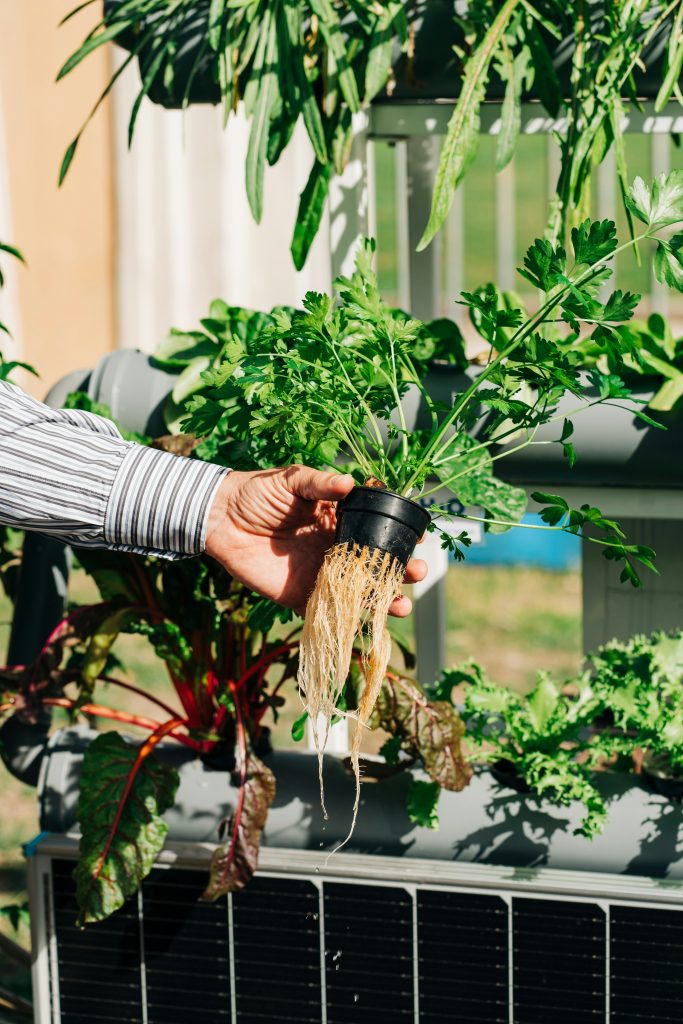
Minimization of Water Pollution
Elimination of agricultural runoff into natural water bodies
Agricultural runoff is a major source of water pollution, with fertilizers and pesticides entering streams, rivers, and lakes, resulting in algal blooms and the depletion of oxygen levels. Hydroponic gardening, by nature, eliminates this source of pollution. With no soil involved, there is no leaching of nutrients or chemicals into natural water bodies. The controlled hydroponic environment ensures that only the necessary nutrients reach the plants, reducing the potential for water pollution and its harmful repercussions on aquatic life.
Reduced use of chemical fertilizers
Chemical fertilizers used in traditional farming can leach into the soil and eventually enter water bodies, causing nutrient pollution. In hydroponic gardening, the use of chemical fertilizers is greatly minimized, as plants are provided with a precise nutrient solution that is carefully balanced to their needs. This targeted approach eliminates the need for excess fertilizers, reducing nutrient leaching and helping to maintain the delicate balance of aquatic ecosystems.
Prevention of nutrient leaching
Nutrient leaching occurs when excess nutrients, such as nitrogen and phosphorus, are washed out of the soil and into water bodies. This leads to the overgrowth of algae and other aquatic plants, disrupting the natural balance of ecosystems. Hydroponic gardening prevents nutrient leaching by providing plants with precisely measured nutrient solutions. This eliminates the risk of nutrient imbalance and ensures that only the necessary nutrients are absorbed, minimizing the potential for nutrient pollution in our water systems.
Conservation of Energy
Lower energy consumption compared to traditional farming
Traditional farming often relies on energy-intensive processes, such as tilling, irrigation, and the operation of heavy machinery. In contrast, hydroponic gardening consumes significantly less energy. The controlled indoor environment of hydroponics allows for more efficient use of light and energy, reducing overall energy consumption. This energy efficiency not only contributes to environmental sustainability but also translates into cost savings, making hydroponic gardening an economically viable option for large-scale food production.
Reduced need for transportation and distribution
Transporting and distributing food from rural areas to urban centers contributes to carbon emissions and energy consumption. Hydroponic gardening can reduce the need for long-distance transportation, as these systems can be set up in urban areas, closer to the consumer. By growing food locally, we can reduce the carbon footprint associated with food transportation, lessen traffic congestion, and make fresher produce more readily available to urban populations.
Utilization of renewable energy sources
Hydroponic gardening can further reduce its environmental impact by incorporating renewable energy sources in its operations. Solar panels, wind turbines, and other renewable energy systems can power hydroponic systems, reducing reliance on conventional energy sources and minimizing carbon emissions. This integration of renewable energy aligns hydroponic gardening with a sustainable and eco-friendly approach to food production, ensuring that the benefits of reduced energy consumption extend to the broader goal of combatting climate change.
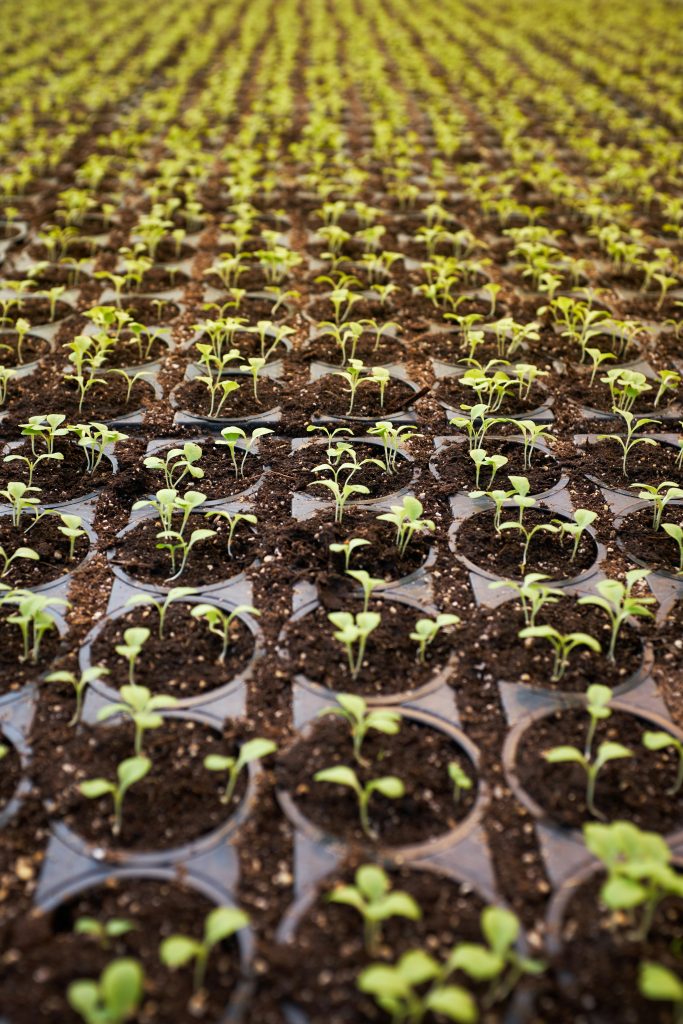
Improved Air Quality
Less exposure to harmful fumes from farm machinery
In traditional farming, the use of various machinery, such as tractors, combines, and generators, releases harmful fumes into the air. This poses health risks for both farmers and nearby communities. One of the advantages of hydroponic gardening is that it eliminates the need for extensive machinery, resulting in reduced exposure to these harmful fumes. By adopting hydroponics, we can significantly improve air quality and promote the well-being of individuals involved in the agricultural industry.
Reduced use of diesel or petrol-powered equipment
Traditional farming often relies on diesel or petrol-powered equipment to perform tasks such as plowing, harvesting, and irrigation. The combustion of these fuels releases pollutants into the atmosphere, contributing to air pollution and climate change. Hydroponic gardening, on the other hand, does not require the use of such equipment on a large scale. With the elimination of traditional machinery, hydroponic systems minimize the emission of harmful pollutants, ensuring cleaner air for all.
Decreased emission of volatile organic compounds
The use of certain chemicals and pesticides in traditional farming can release volatile organic compounds (VOCs) into the air. These compounds contribute to air pollution and can have detrimental effects on human health. Hydroponic gardening significantly reduces the need for such chemicals, resulting in a decreased emission of VOCs. By adopting this environmentally friendly approach, we can improve air quality and create safer environments for both agricultural communities and the general public.
Year-Round Productivity
Elimination of seasonal limitations
One of the significant advantages of hydroponic gardening is its ability to eliminate seasonal limitations on food production. Traditional soil-based gardening is heavily reliant on weather conditions and seasonal changes, which can restrict the availability and productivity of crops. In hydroponics, environmental factors such as temperature, humidity, and light can be precisely controlled, allowing for year-round productivity. This consistent production of fresh, high-quality produce is an immense benefit for ensuring food security and meeting the demand for locally grown food throughout the year.
Continuous harvesting in controlled environments
Hydroponic gardening allows for continuous harvesting in controlled environments, ensuring a consistent supply of fresh produce. With the ability to manipulate growing conditions, such as providing optimal light and nutrients, hydroponic systems can accelerate plant growth and shorten the time required for crops to reach maturity. This means that farmers can harvest their crops more frequently, maximizing productivity and meeting market demands. The ability to harvest throughout the year provides farmers with a stable income source while ensuring consumers have access to fresh, nutritious food regardless of the season.
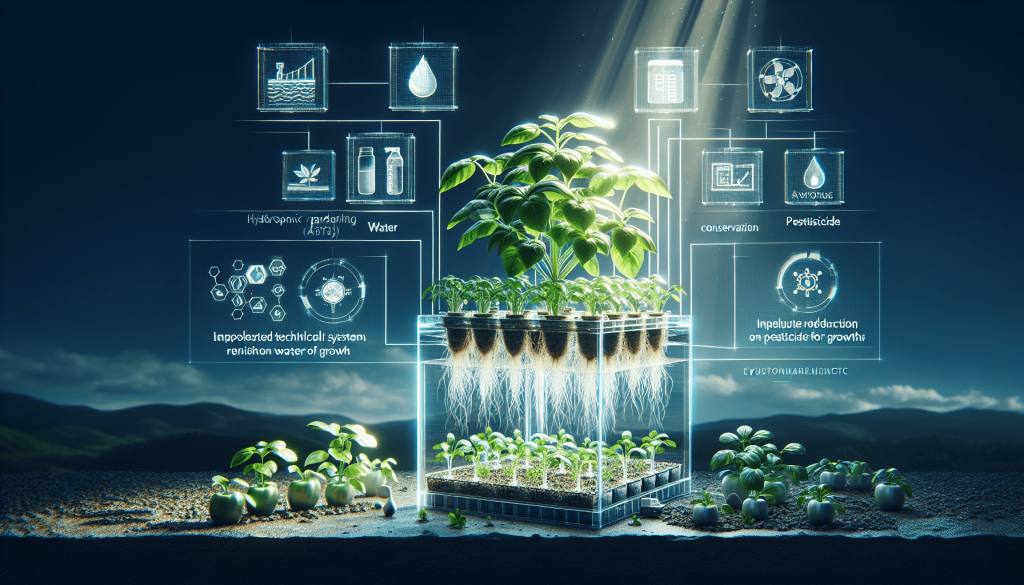
Growth of Organic Produce
Easier transition to organic farming practices
Organic farming practices prioritize the use of natural fertilizers and the avoidance of synthetic chemicals. Hydroponic gardening offers an easier transition to organic farming practices as it already minimizes the use of chemical fertilizers. By precisely controlling the nutrient solutions and eliminating the reliance on synthetic pesticides, hydroponic systems can meet the organic certification standards. This presents an opportunity to grow organic produce sustainably while minimizing the potential harmful impacts on the environment and human health.
Reduced reliance on synthetic pesticides and fertilizers
Traditional farming often relies heavily on synthetic pesticides and fertilizers to protect crops and promote growth. However, these chemicals can have negative impacts on ecosystems and human health, including soil degradation, water pollution, and potential health hazards. Hydroponic gardening reduces the reliance on synthetic pesticides and fertilizers by creating a controlled environment where the risk of pest infestations can be minimized naturally. By adopting hydroponics, we can grow crops that are healthier and free from the harmful residues of synthetic chemicals.
Biodiversity Conservation
Protection of natural habitats
The expansion of traditional agriculture often comes at the expense of natural habitats, leading to deforestation, habitat destruction, and the loss of biodiversity. Hydroponic gardening offers a sustainable alternative that protects natural habitats. By utilizing vertical farming and unused urban spaces, hydroponic systems provide opportunities for food production without encroaching on pristine ecosystems. This preservation of natural habitats promotes biodiversity conservation, ensuring the survival of various plant and animal species that rely on these habitats for their survival.
Preservation of native plant and animal species
The preservation of native plant and animal species is crucial for maintaining the natural balance and biodiversity of ecosystems. Traditional agriculture often relies on monocropping, where large areas of land are dedicated to growing a single crop, resulting in the loss of habitat complexity and niche diversity. In contrast, hydroponic gardening allows for the preservation of native species by supporting diverse plant growth in compact spaces. By creating suitable habitats for a variety of plants, hydroponics promotes the survival of native species, contributing to the overall conservation of biodiversity.
In conclusion, hydroponic gardening offers numerous environmental benefits and represents a sustainable and innovative approach to food production. From enhanced water efficiency and conservation of land to reduced environmental footprints and improved air quality, hydroponics provides a pathway towards a more sustainable and eco-friendly future. By adopting hydroponic systems, we can revolutionize the way we grow food, ensuring long-term food security while minimizing the negative impact on the environment and promoting a healthier planet for future generations.
